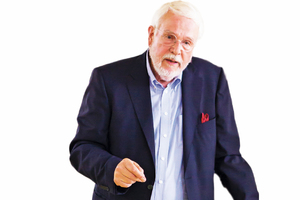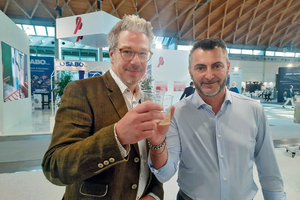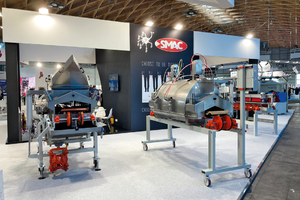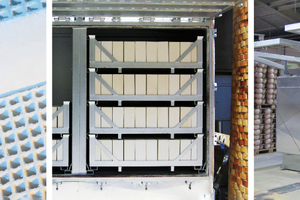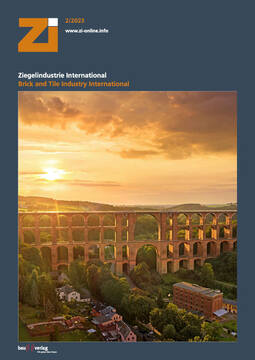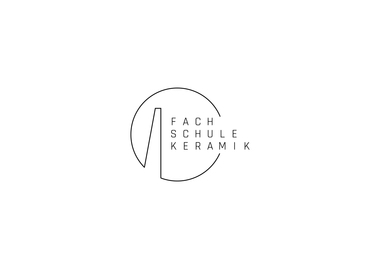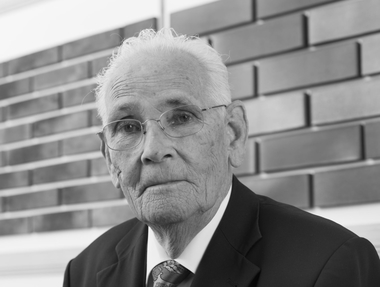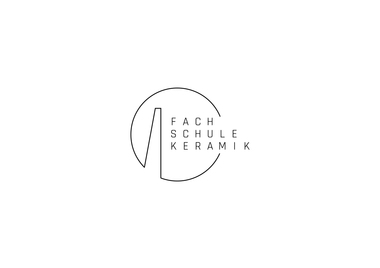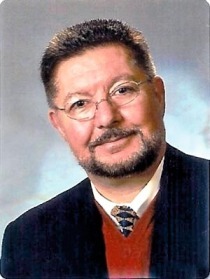Generation change at Medau
Jan Hinrich Medau has taken over the company‘s activities after the death of his father Karl Hinrich Medau in January 2021. In an interview with Brick and Tile Industry International, he describes how his father built up Ingenieurbüro Medau and IKEMA, what challenges the takeover brought and what he plans to do next as an entrepreneur. Büro Medau is a distributor for Ceramic Instruments and SMAC in GSA, Benelux and Scandinavian regions, as well as a global supplier of dry absorption systems for hydrogen fluoride under the name HF Absorb and brand communication services under the name Gallo Giallo.
History of the Medau Engineering Office and IKEMA Service GmbH
Jan Medau: My father followed his interest in ceramics professionally throughout his life. After training as a potter at the Landshut Ceramics School and apprentice years in Switzerland, he completed an engineering degree in ceramics and mechanical engineering in Höhr-Grenzhausen at the Koblenz University of Applied Sciences. He then worked for the mechanical engineering company Keller in Laggenbeck, Westphalia. At the end of the 1960s, as an independent trading partner, he took over their general agency in Milan, Italy. There he founded the engineering office Medau, but returned to Germany in 1983.
JM: He turned the tables and represented Italian supplier companies in Northern Europe. To do this, he founded IKEMA, which stands for Italian Ceramic Machinery. In the first years he took over the distribution for Poppi and System Ceramics. Poppi was an Italian kiln manufacturer, System Ceramics still produces equipment and machines for automation, transport and packaging. In the 90s, new distribution partnerships with Officine SMAC and Ceramic Instruments (CI) emerged. He also worked in the industry as a consultant and engineer at the same time.
JM: Besides his day-to-day business, he was very active in Eastern Europe, for example, where he supervised factory upgrades with second-hand machines from Germany, Italy or France. Many people in Germany are still familiar with him because of his involvement in the Ceramic Society. Promoting young talents was also always very close to his heart.
JM: His first in-depth contact with the topic of gas filter systems was with the Swiss heat and flue gas exchanger manufacturer Air Fröhlich. My father worked there for a short time after his return from Italy in 1983. Later, together with the Steuler company, he developed today‘s product and brought it to market maturity.
Handing over the business
JM: Two factors played into it. On the one hand, there were weighty reasons for continuing to operate. The name Medau was and is well established in the industry. Both Italian partners, SMAC and CI, were very interested in continuing the cooperation, and it was very convenient for them that I also speak fluent Italian. On the other hand, although I am not a specialist, I was well acquainted with the topics and was simply curious about the challenge.
JM: I originally come from a completely different background. After more than 15 years as a self-employed professional pilot, I reoriented professionaly at the beginning of the 2000s. After training as a graphic designer in an advertising agency and studying business psychology, I worked for a long time in the field of brand design and consulting. There I had many points of contact with mechanical engineering.
I had my first intensive insight at the international machine manufacturer Krauss-Maffei (plastics industry), where I helped design the brand relaunch for three and a half years. That sparked my deeper interest. Then, after a short stay in Hong Kong, I started my own design studio, Gallo Giallo. Since then, in addition to my other clients, I have designed the entire brand communication, advertising, brochures, etc., for my father. Therefore, I already had a good theoretical overview when it came to the handover decision.
Because of this experience and my interest in mechanical engineering, it was not difficult for me to decide to continue my father‘s business areas. I had to close the engineering office because I am not a studied engineer; the remaining areas of activity were merged. That is why the company is now called Büro Medau.
Products and services
JM: Ceramic Instruments is known for its laboratory and control instruments. Many industrial laboratories throughout the ceramics industry use the instruments, but also educational institutions such as universities or vocational schools. The fine mills manufactured by CI are also in demand in other industries.
SMAC manufactures machines and systems for all functions in the field of dry and liquid surface decorations: preparation of glazes and engobes, stirring and mixing vessels, machines for the various types of application, with centrifugal and spraying booths, as well as application machines for effects with sand and powder or even digital printing. In addition, there are various systems for automatic quality monitoring and correction, e.g. for the density and viscosity of glazes and engobes, as well as systems for the automation and control of corresponding production lines. The main customers are the brick and tile industry. All machines and systems are always individually adapted to the customers‘ requirements and „tailor-made“. This is unavoidable as we usually have to fit into existing production lines, often under challenging space conditions.
JM: Shortage of skilled workers and the increasing demands of today‘s employees regarding, for example, the cleanliness of the working environment as well as the reasonableness of the activities at the machines are important topics in many ceramic production plants. The automatic preparation of the engobes and their permanent control as well as automatic cleaning cycles for colour changes relieve the factories immensely. Instead of spending two hours cleaning a centrifugal machine with a high-pressure cleaner, an employee can now take on more important tasks. Both sides, employer and employee, benefit from this.
JM: HF Absorb is of interest to all companies that emit hydrogen fluoride as part of their production processes and have to clean their exhaust gases in order to comply with legally prescribed emission limits. This applies especially to the ceramic sector, where hydrogen fluoride is released during ceramic firing, but goes beyond that. For example, in the glass or metal processing sectors. We currently have an enquiry from a steel producer in Linz, Austria. A special coating applied to steel sheets emits hydrogen fluoride during drying. As the plant is located in the centre of Linz, they have to comply with strict limits and invest in more sustainable production targets. Due to the same exhaust emission standard, there is theoretically potential demand for our filter systems in the entire EU area.
JM: The HF Absorb filter differs from most systems on the market in that it is based on dry sorption rather than wet sorption. The advantages of the dry separation process are the individual size of the reactors, decentralised use close to the emission point, and easy installation and operation. Investment and operating costs are significantly lower than those of comparable wet sorption plants, at an average of twenty to twenty-five percent. So for small and medium-sized plants and exhaust volumes, HF Absorb is unbeatable in terms of price. For larger plants and larger volumes of flue gas above 35,000 cubic metres per hour, the efficiency advantages of dry sorption no longer come into play.
JM: We have sold many filter systems to existing customers in the German ceramics industry. These include manufacturers of sanitary porcelain such as Duravit and Laufen, porcelain manufacturers such as Meissen, Villeroy and Boch or, since last year, Friesland Porcelain, but also some tile and brick manufacturers such as Deutsche Steinzeug, Steuler Fliesen or Tonality in Westerwald. Individual filter plants are also located in Belgium, Luxembourg, Switzerland, France and Mexico. We still see considerable market potential in Germany, but also in the large ceramic locations in Spain, Portugal and France. We want to expand our presence there. To this end, we are currently looking for sales partners who can support us in accessing the market. Asia or North America could also become interesting, provided that comparable emission limits are introduced or companies want to position themselves as pioneers there.
Present
JM: Demand is developing quite well, our customers‘ order books are still full, the investment mood is steady. Here and there there is scepticism about what 2024 and 2025 will bring in view of rising interest costs and a slump in the construction industry. It seems that there is much more confidence regarding investments in Aisa. In Germany and Northern Europe we hope for a similar development in the medium term, once the construction industry has recovered or stabilised. We are optimistic that some companies will use the quiet phase for modernisation.
JM: The war is noticeable in various places. Many clays and bases for glazes came from Ukraine. That‘s why engobes are as valuable as gold at the moment. Their efficient use, i.e. collecting superfluous material and feeding it back into the cycle, has clearly gained in importance. SMAC‘s systems offer meterable spraying systems with an effective recycling function. Such savings and optimisation potentials work really well and are currently in great demand.
We notice limitations in supply chains for electronic components. Last year, the waiting time for components from Siemens was eight months for one customer. That was unthinkable just a few years ago. With these huge lead times and many other extraneous factors playing into it, it has unfortunately become more difficult to guarantee on-time deliveries. This year, however, the situation seems to be much more relaxed.
Future
JM: The first goal is to reach my father‘s turnover figures again. We are on the right track, despite delays due to the consequences of the corona pandemic and the Ukraine war. I also want to position HF Absorb more strongly in the rest of Europe. The third goal is to re-establish old customer contacts and make more inaugural visits. In the one and a half years I‘ve been in the business, it‘s been hard to do that.
JM: Very much so. Dear customers and partners of the former Medau engineering office: My father still managed information in analogue form. Before his sudden death, he could not hand over a complete customer file to me. He took many contacts with him to the grave, so to speak. A lot has happened in the past years, both with us and with you, I assume. I am looking forward to your contact requests to enable a mutual refreshing of long-standing business relationships.

